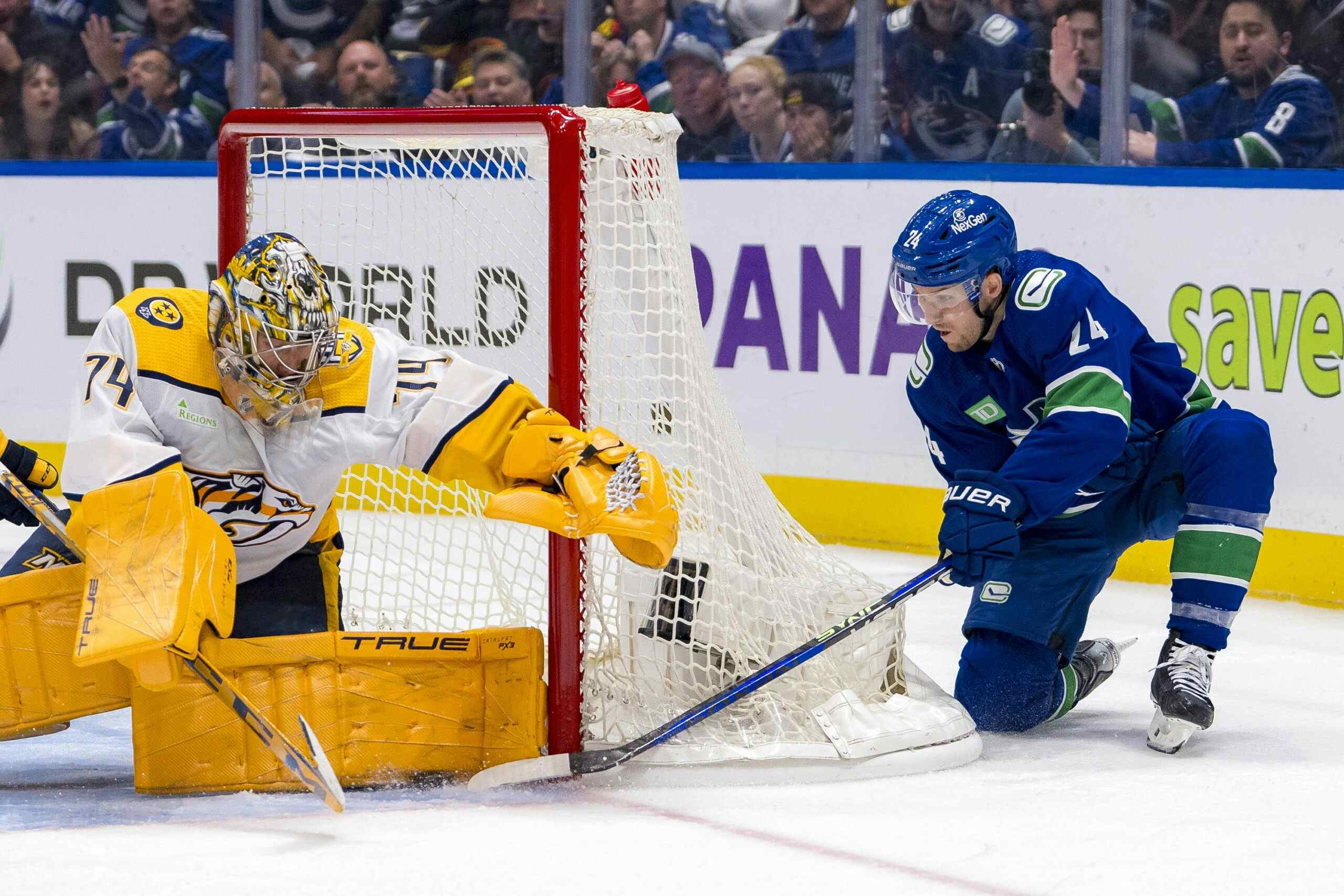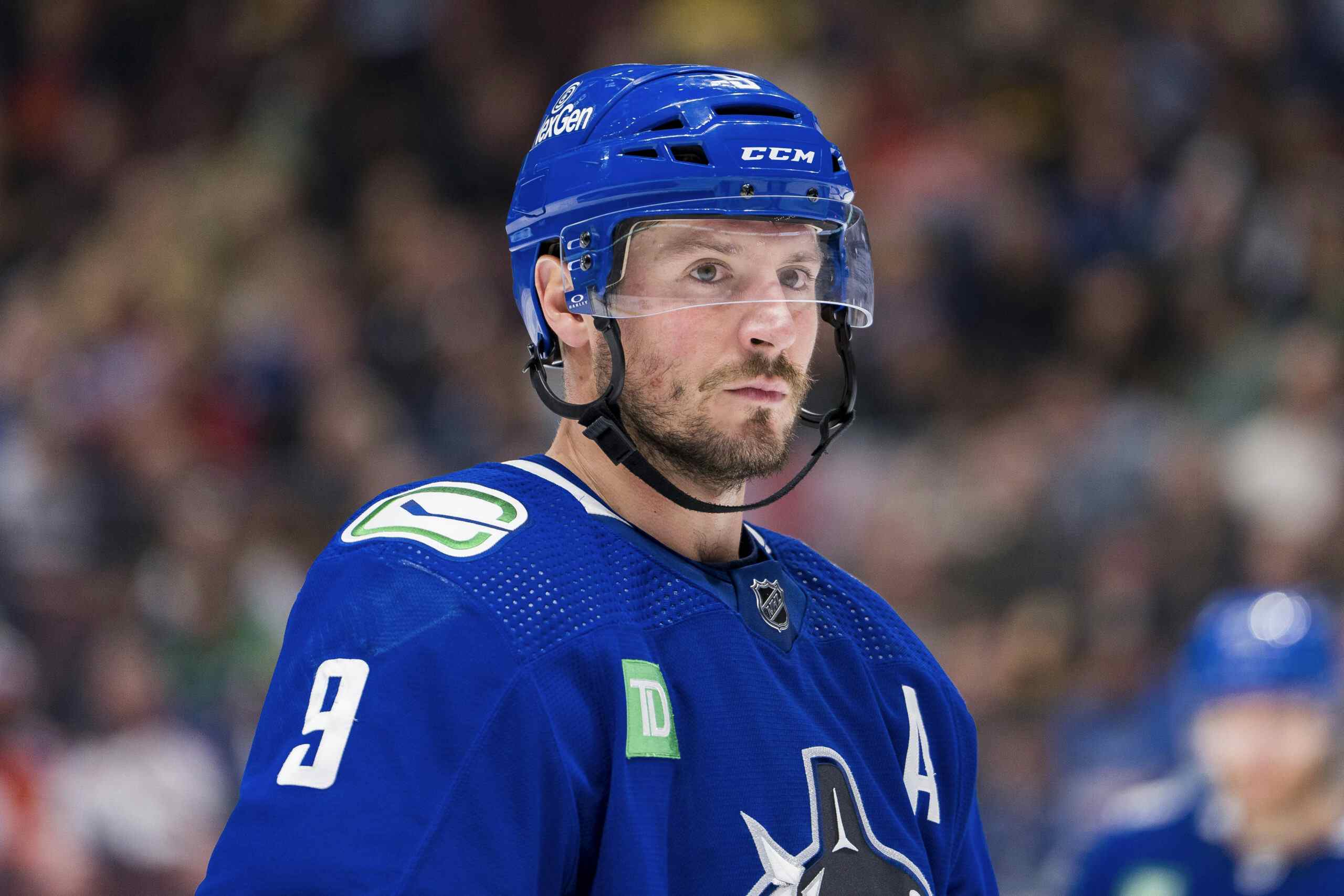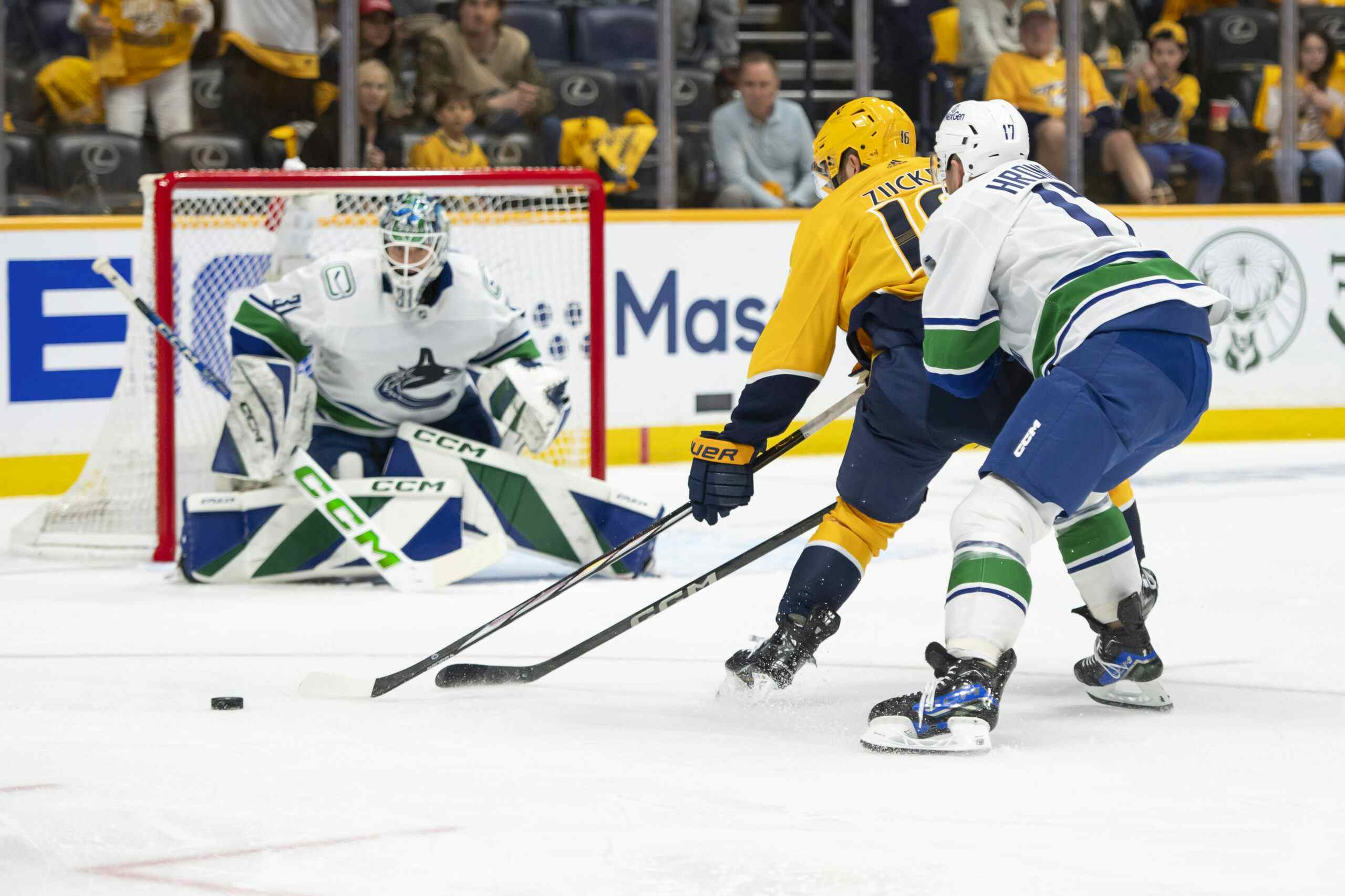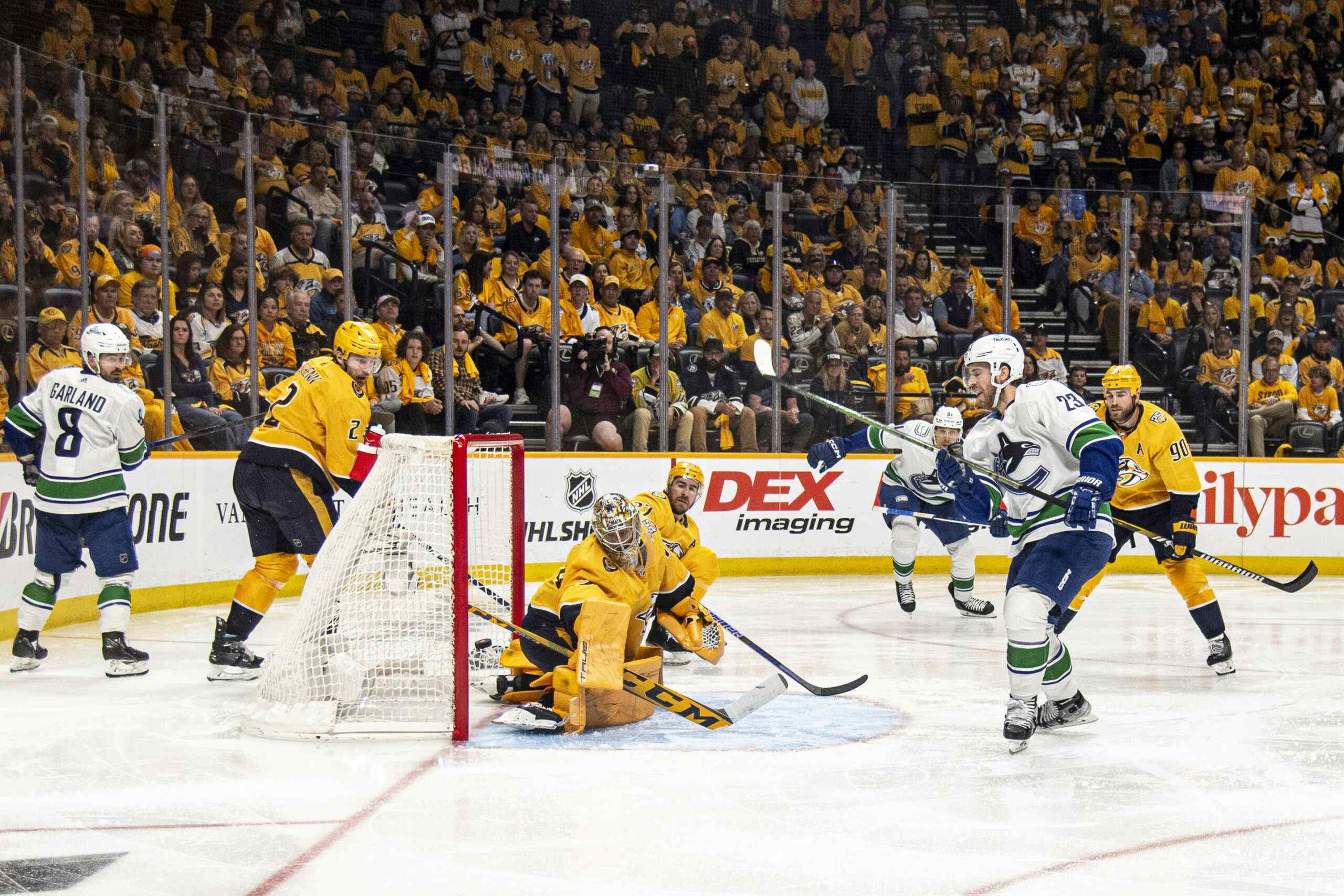How Long Will The Lockout Last?
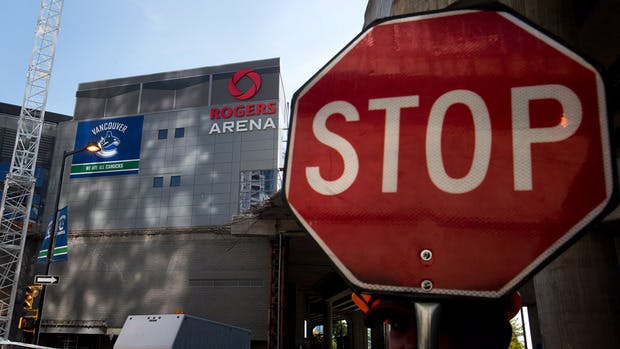
Photo Credit: Darryl Dyck/Canadian Press
As the prospect of a prolonged NHL lockout came into focus during the course of the summer, a consensus emerged: that the team could actually stand to benefit from a shortened season. Tony Gallagher wrote about it, Jeff Angus wrote about it and Dimitri Filipovic wrote about it, and they all agreed: in a shortened season the team wouldn’t necessarily miss Ryan Kesler (who is recovering from labrum surgery until December), and they might be a little bit fresher headed into the postseason.
The flip side of this particular coin is another consensus, this one more worrisome. It’s widely believed that losing an entire season would be an unmitigated disaster for the Canucks and their aging core. This teams "window to win" is this season (before Alex Edler, and key role players like Chris Tanev, Chris Higgins and Max Lapierre are due for a raise), and perhaps a season or two beyond it. The Sedins aren’t getting any younger and Kesler isn’t getting any more durable, so losing a full campaign and another shot at hoisting that cherished silver mug would be, to use a euphemism, inconvenient.
The lockout is now eight days old, and will finally cost the Canucks some preseason games beginning tonight. With that, let’s wade into the muck and try to determine which scenario – a shortened season, or a lost one – looks to be more likely at the present juncture. Read past the jump.
To begin with, I’d remind our dear readers that I have no formal negotiating experience and my understanding of sports labour law and collective bargaining basically stops at "I read Money Players this summer!" But I figure that in this, as in most things, using common sense can still be instructive. With that important qualification behind us, let’s get to it.
Various NHL players have recently stepped up the rhetoric regarding the possibility of losing an entire season (or more) to the lockout. Dan Cleary for example, had this to say to the Detroit Free Press:
"I think people don’t think it can go a year," Cleary said after several Wings held an independent skate at Troy Sports Center. "As players, we think it can. Maybe longer."… The trend among pundits has been predicting a 60-game season that will start around Thanksgiving. But that hope might be fading."Just trying to be realistic," Cleary said. "I think the league is waiting for us to make the move, and we’re waiting for them to move. So someone has to move. And I don’t see it coming from our end. We’ve given them a couple of good options that they can work with, and they, obviously, feel it’s not good enough."We’re at a stalemate, I guess you can say. We’re stuck in the middle right now."
The NHLPA and the NHL stalemate is ongoing, and for the past 10 days we’ve been in a pretty standard "brinksmanship" holding pattern. That stance doesn’t appear to be thawing on either side and NHL underboss Bill Daly echoed Cleary’s "we’re waiting on the other side" comments today in a conversation with Chris Johnston:
Bill Daly says the league is waiting for the NHLPA to come forward with another proposal for CBA talks to resume.— Chris Johnston (@reporterchris) September 24, 2012
But let’s get away from the "he said, she said," for now, because it’s not altogether that relevant. The players haven’t missed their first paycheque yet, and while preseason games are a cash cow for the owners; that the two sides aren’t negotiating is troubling, but not really all that meaningful. And anyway, the key language in Cleary’s quote is, "As players we think [the lockout] can [go a year]. Maybe longer."
In Chicago, Blackhawks captain Jonathan Toews offered beat writer Chris Kuc a similar sentiment:
#Blackhawks‘ Jonathan Toews on NHL owners: "If they want to hurt their own game and drive it into the ground that’s what they’ll do."— Chris Kuc (@ChrisKuc) September 24, 2012
It’s not a surprise that players across the board are openly discussing the possibility of losing an entire season – or more. As we’ve already seen in the lead up to the lockout, the messaging efforts from #theplayers have been generally well coordinated and unified. What Toews and Cleary’s comments tell us is that, at this point it’s important for the players’ negotiating position that they appear to be willing to go the distance this time (unlike in 2004-05 when Trevor Linden, and the NHLPA flinched). The talk sounds tough, but I wouldn’t get too worked up about the prospect of a lost season, at least not yet.
On Friday, over at the New York Times, Jeff Z. Klein asked around and tried to read some tea leaves regarding the possible length of the lockout. He concluded that the resolve of the NHL’s owners will likely be tested this time, and he quoted marketing executives who compared the NHL’s Winter Classic "pressure point" and its impact on the current lockout, to the effect the Christmas Day slate of games on ABC had on the NBA lockout last fall.
This is an analogy I’ve been particularly fond of in talking about a potential "lockout end date" thus far. October and November are basically a wash for the league’s owners anyway: nationally broadcast games really kick in come January, and anyway playoff revenue is the league’s primary cash-cow (players aren’t paid after game 82 of the regular season).
On the impact of the Winter classic Klein writes:
"The potential pressure points include the Winter Classic, the extravagant Jan. 1 outdoor game and NBC telecast that has proved vitally important to the N.H.L.’s visibility, and the need to avoid further financial disruption for the estimated 16 to 18 money-losing teams…Many believe that the owners’ resolve will be tested in December, when pressure mounts to return to play ahead of the Winter Classic on Jan. 1.The five previous Winter Classic games, all carried by NBC, were the five most-watched regular-season hockey games in North America since the 1970s. Including corporate sponsorships and merchandise sales, the game generates a profit in the “substantial seven figures,” John Collins, the league’s chief operating officer, said last year.This season’s game is especially grand in scale. It is to be played at Michigan Stadium in Ann Arbor before a crowd of perhaps 115,000, which would be a world record for hockey. It will involve the Detroit Red Wings and, for the first time, a Canadian club — the Toronto Maple Leafs, the N.H.L.’s most valuable and popular team."
But could the winter classic really save the 2012-13 season, or has this been radically over-stated? Klein offers us some interesting (if unsourced) insight into that question as well:
"But NHL. officials say privately that the Winter Classic is not a factor in negotiations, pointing out that the regular season’s first weekend generates more revenue than the Winter Classic."
Again, what NHL officials are telling a Times reporter privately could just be tough talk. While the league is generally in a much healthier financial position than it was in 2004-05, the television exposure it benefits from with the Winter Classic (and HBO’s 24/7 in the lead up to the outdoor showcase) is invaluable for the "fourth" major North American sports league…
The blame the fan crowd may not understand it, but the NHL has a fair bit of skin in the game and the idea that they could come out of another lockout unscathed is preposterous. Even though the public was on their side by a wide margin in 2004-05, it took a substantial amount of "New NHL branding" and an injection of absurdly talented young stars like Ovechkin and Crosby to help the league overcome the New Coke after taste of losing the entire 2004-05 campaign.
Sure, if a full season is lost, Canucks fans will be back (Canucks fans would be back even if the league lost two seasons and when it returned the Sedin twins, at 34, were 60 point per season power-play specialists) – but will Panthers fans be back? Could Bettman’s Glendale experiment survive a lost season? How about two? Or what about the southern darling that is the Nashville Predators, who, if a full season is lost – but a new CBA is agreed to prior to July 1st 2013 – could end up paying Shea Weber 26 million to appear in zero games?
Meanwhile, the players appear to be standing strong so far, but the rubber won’t really meet the road until their Escrow money runs out (let’s say mid to late November). At this point, hockey fans should be buckling up for a 2 and a half or 3 month work stoppage. If I had to bet, I’d still posit that we’ll have a new CBA before the calender turns to 2013. If I’m wrong, however, it’ll be a calamity – not just for the Canucks and not just for hockey fans – but for the league, and the sport of hockey.
Recent articles from Thomas Drance


